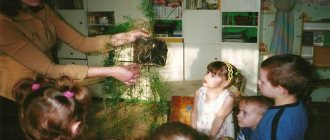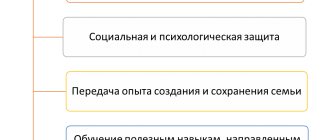The concept and content of spiritual and moral education
Definition 1
Spiritual and moral education is a purposefully organized pedagogical process of assimilation and acceptance by students of cultural, spiritual and moral values.
The essence of spiritual and moral education lies in the consistent expansion and strengthening of the value sphere of the child’s personality, the formation of his ability to find, see, perceive and evaluate beauty on the basis of cultural and moral norms and traditions.
Main directions of spiritual and moral education:
- Fostering love for the Motherland, developing patriotism, respect for the rights and freedom of every person.
- Education of aesthetic consciousness and moral feelings.
- Fostering hard work, a positive attitude towards work, learning and life.
- Formation and development of a value-based attitude towards a healthy lifestyle, one’s health, love and respect for family, nurturing family values.
- Fostering a respectful and valuable attitude towards the surrounding world, nature, and native land.
- Cultivating a value-based attitude towards aesthetically beautiful things, forming ideas about ideals and values.
Are you an expert in this subject area? We invite you to become the author of the Directory Working Conditions
Principles of spiritual and moral education:
- the principle of personal moral example;
- the principle of socio-pedagogical partnership between all participants in the educational process;
- the principle of individuality in education;
- the principle of integration of educational programs;
- the principle of relevance and relevance of education.
Features of moral development of young children
At an early age, children begin the process of moral personal development, which
- cognitive (information) aspect – knowledge and ideas about moral concepts, standards, norms, rules, personal moral qualities;
- emotional and motivational aspect - moral feelings, social and moral emotions, moral motives and preferences, moral assessment and self-esteem;
- behavioral aspect - moral actions and deeds, moral habits, i.e. implementation of moral norms and requirements.
The interrelation of cognitive, affective and behavioral components in the personal sphere determines the unity of moral consciousness and behavior . These components only begin to form at an early age. This is facilitated by children’s desire to collaborate with adults and their high imitation.
In early childhood, the child begins to understand certain moral rules of behavior . Such an understanding is limited to a specific situation, the framework of the child’s visual and effective thinking. Understanding the rules and norms of behavior is based on the child’s own experience, when he realizes the negative consequences of breaking the rules and the positive consequences of following them. In this regard, from an early age, an adult must justify the demands put forward, based on specific life situations and the child’s own experience. In children's active vocabulary there are few words denoting moral categories; evaluation and ethical concepts are used: good - bad, good - evil, etc. The concepts “bad” and “good” initially express the attitude of an adult, and the child only remembers and repeats them in similar situations . The content of motivational orientation from the standpoint of moral education is still poorly developed.
The development of the emotional component of a child’s morality is associated with the formation of intelligence, his mental activity, and a system of knowledge about encouraged and condemned patterns of behavior. Through this, the child gradually has the opportunity to evaluate his behavior and prepare to perceive the upcoming assessment of his activities by adults. A child’s moral emotions are manifested and strengthened in the process of observing specific actions and deeds of a person. For the moral development of a child, an organic connection between knowledge (moral concepts) and moral assessments of behavior (good - bad) is necessary. The formation of only knowledge about the moral qualities of people cannot ensure the emergence of corresponding moral feelings and emotions in a child; they appear in him as an expression of his own attitude to a certain human act, based on existing needs, a set of knowledge and experiences. The role of an adult in the moral development of children is that he teaches the child to evaluate actions and evokes in him an appropriate emotional attitude towards what is currently happening in a particular situation. Fixed in the child’s mind, such assessments begin to express his positive or negative attitude towards himself and the actions of others.
The increasing complexity of a child’s activities and his increasing independence lead to the need to introduce more complex moral rules of behavior. By obeying these rules, the child learns to regulate his actions. Compliance with moral norms and rules is not of independent importance for children, but is a means of maintaining positive contacts with adults and receiving a positive assessment from adults. The need for a positive assessment from an adult encourages the child to act in accordance with the rules.
Early age corresponds The stages corresponding to the premoral level are:
- obedience of a child to avoid punishment;
- the conditioning of actions by selfish considerations of mutual benefit (obedience in exchange for receiving some specific benefits and rewards);
- the conditioning of actions by the desire for approval from “significant others” and shame before their condemnation.
This does not mean that the child, under the influence of these motivating factors, systematically controls his behavior. It is very difficult for young children to resist immediately gratifying a momentary desire and even more difficult to perform an unattractive action at the suggestion of an adult. When performing uninteresting tasks for an adult, children either change them or get distracted and do not complete the task.
The formation of moral habits and actions is formed gradually; if an adult consciously puts forward systematic, consistent and motivated requirements, checks their implementation, then the implementation of such rules becomes habitual for the child. The child quickly reacts to the usual rules. Gradually, discipline, organization, and the need to follow the rules are formed, which contributes to the assimilation of more complex rules of behavior and the formation of moral qualities of the individual. The formation of moral habits in early childhood occurs in everyday activities, when an adult shows a model of behavior and requires the child to follow this model, first in joint activities with him, and then in independent activities.
Case Study
Maxim M., 2 years 8 months. His mother tries to ensure that her son sees manifestations of compassion and care among family members towards each other. “Don’t make noise, dad is tired, he’s sleeping. Don’t wake up dad,” mom says in a whisper. Maxim, imitating her, begins to behave quietly and, if one of the adults accidentally forgets, he himself will remind: “Nezya, daddy is drinking.”
In general, a young child is characterized by spontaneous morality. The child performs positive actions at the request of an adult and most often does not identify them as such. Without control and evaluation from an adult, the child acts situationally and impulsively, and therefore often breaks the rules. The moral behavior of young children is closely related to a positive emotional attitude towards the object at which it is directed. A child is more likely to do a good deed towards an adult or child whom he treats well. A positive emotional state, sympathy and goodwill towards other people and animals are the basis for moral manifestations.
Thus, the moral development of a young child occurs on the basis of presenting a system of demands to adults and teaching them to fulfill them. This is facilitated by children’s desire to establish and maintain positive contacts with adults. Based on imitation of adults’ assessments, the first value judgments are formed, which are then transformed into the child’s own attitude towards himself and other people. However, situational and impulsive behavior often leads to violation of requirements and prohibitions. The moral manifestations of a child depend on the emotional attitude towards an object and arise spontaneously, unconsciously, when prompted by an adult or in a specific situation.
Historical aspects of spiritual and moral pedagogy
The development and establishment of the education system in any state is closely connected with its history. Historical periods in the development of states are characterized by certain views on the education and upbringing of children, the possibilities of the educational process, the needs of society for educated and trained people, and, finally, the state of the state education system.
Analysis of historical and archival documents, legal documents in the field of education, regulatory, journalistic and artistic sources allows us to talk about family and home education as a complex educational process determined by the changing social, sociocultural and economic situation in the country.
Since ancient times, people have created their own pedagogy, preparing children for practical activities, for the struggle of life with the help of a variety of educational means.
With the advent of the family, family education became practically the only form of education for children in society for many millennia; schools and other educational institutions were few in number and served a small proportion of children, mainly from the privileged classes. The class character of society determined the different content and direction of family education in different social groups.
In the education system developed in Athens in the 7th-5th centuries. Century BC family upbringing and education took a dominant position. Unlike the Spartan education system, which was state-owned, in Athens children under 7 years of age were in the sphere of family education. For girls, in accordance with the position of women in a slave society, there was only a home education system. In addition to the traditional basics of literacy (reading, writing, counting), they were taught to play musical instruments, home economics, needlework and sewing.
Many principles of the Spartan and Athenian educational systems were further developed in Rome (6th century BC). As in Athens, boys were raised and educated until the age of 7, and girls even later, under the supervision of their mother or older relatives, who were responsible for their education. From the age of 7, boys began to study, usually under the supervision of their fathers. Education had a purely practical purpose - to prepare the child for social, military and economic activities in those forms that were dictated by the social status of the family. Thus, in addition to reading, writing and arithmetic, which were taught to everyone, the son of an artisan or peasant was prepared to work on his father’s farm; the son of an aristocrat learned to wield weapons, swim, ride a horse, learned something about the management of Ancient Rome and learned to manage agricultural work on his father’s estate. The main feature of Roman education and upbringing was its pronounced civic character. The main goal was to educate an active member of society, capable of sacrificing himself for the sake of family and state, a brave soldier who despises everything foreign, a skillful politician and a prudent landowner. In subsequent centuries, this system was largely preserved, only a few changes were made: The education of children began to be entrusted to slaves, and specially invited teachers were involved in their upbringing.
Family is one of the main themes of ancient Russian literary and pedagogical monuments of the 14th century. and domestic collections of the 14th century. The pedagogical thought of Ancient Rus' was clearly manifested in the “Instructions for Children” by Prince Vladimir Monomakh, in such literary and written monuments as “Bee”, “Prologues”, “Chrysostom”, etc. In the understanding of ancient Russian authors, the true wisdom of family education is associated with high morality, with Christian virtues.







